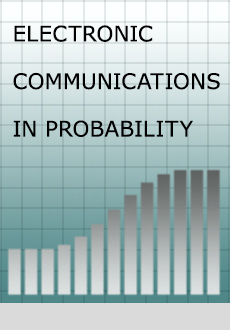Abstract
The fractional Poisson field (fPf) is constructed by considering the number of balls falling down on each point of $\mathbb R^D$, when the centers and the radii of the balls are thrown at random following a Poisson point process in $\mathbb R^D\times \mathbb R^+$ with an appropriate intensity measure. It provides a simple description for a non Gaussian random field that is centered, has stationary increments and has the same covariance function as the fractional Brownian field (fBf). The present paper is concerned with specific properties of the fPf, comparing them to their analogues for the fBf. On the one hand, we concentrate on the finite-dimensional distributions which reveal strong differences between the Gaussian world of the fBf and the Poissonnian world of the fPf. We provide two different representations for the marginal distributions of the fPf: as a Chentsov field, and on a regular grid in $\mathbb R^D$ with a numerical procedure for simulations. On the other hand, we prove that the Hurst index estimator based on quadratic variations which is commonly used for the fBf is still strongly consistent for the fPf. However the computations for the proof are very different from the usual ones.
Citation
Hermine Biermé. Yann Demichel. Anne Estrade. "Fractional Poisson field and fractional Brownian field: why are they resembling but different?." Electron. Commun. Probab. 18 1 - 13, 2013. https://doi.org/10.1214/ECP.v18-1939
Information





